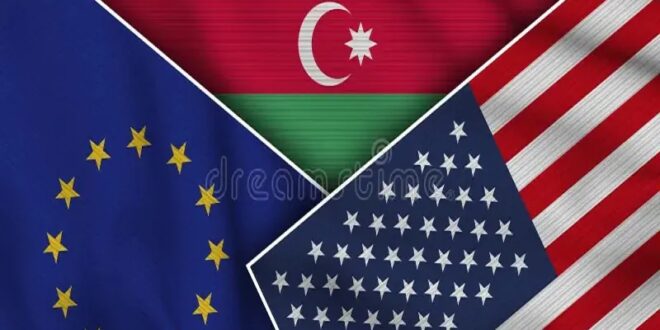The regional geostrategic reorientation that’s presently unfolding in the “Greater Caucasus” is leading to Azerbaijan becoming a pivotal player in multipolar processes while Armenia is becoming the greatest such obstacle to them.
The West had hitherto attempted to maintain the pretense of neutrality towards the Armenian-Azerbaijani Conflict and particularly its Karabakh component, but that all changed after Baku’s successful 24-hour anti-terrorist operation in mid-September restored the state’s writ over that separatist region. In the intervening two months, the West decisively pivoted towards Armenia after sensing that it would be maximally amenable to their outreaches in the aftermath of its decisive defeat in that conflict.
Instead of continuing to pay lip service to their officially neutral stances towards this conflict, the US and EU took Armenia’s side over Azerbaijan’s, thus prompting fierce rebukes from Baku. US Assistant Secretary of State for European and Eurasian Affairs James O’Brien recently cancelled some visits by Azeri officials and suspended his country’s military aid to it on the pretext that peace talks with Armenia aren’t progressing fast enough. Azerbaijan’s Foreign Ministry responded to this provocation as follows:
“It was Azerbaijan who was among the first nations who fought shoulder to shoulder with the U.S. side in Afghanistan. Azerbaijan was also the last partner nation to leave Afghanistan. Therefore, it turns out that the U.S. side has always considered the support of Azerbaijan as occasional, while it should be reminded that the history has always repeated itself. Such an indifferent action by the U.S. side not to waive the 907 Section is an ill-disposed step toward Azerbaijan.
…
Concerning the statement that the US side has cancelled high-level bilateral meetings and engagements, which were initiated by the US side with Azerbaijan, and that there cannot bebusiness as usual’ in our bilateral relationship’, it should be noted that the relations cannot be one-sided. Consequently, the same approach will be applied equally by Azerbaijan. In these circumstances, we consider the possibility of high-level visits from the United States to Azerbaijan inappropriate as well.
Moreover, such a unilateral approach by the United States could lead to the loss of the mediation role of the United States. Under these circumstances, it is important to note that we do not consider it possible to hold the proposed meeting on the level of the Foreign Ministers of Azerbaijan and Armenia, in Washington on November 20, 2023. International law norms and principles have always been a priority for Azerbaijan in its foreign policy. Azerbaijan will always act in line with its international obligations.”
This strongly worded statement shows that Azerbaijan won’t tolerate American disrespect or pressure. The same goes for its approach towards the EU’s similar such provocations, particularly the latest one whereby European External Action Service Spokesman Peter Stano demanded that Azerbaijan voluntarily relinquish a broad degree of its hard-earned restoration of sovereignty over Karabakh via the hosting of EU forces on the pretext of protecting Armenians. Here’s how its Foreign Ministry responded to that:
“We consider the EU representative’s remarks about the initiative to establish an international mechanism for the rights and security of Armenian residents linked to the personal choice driven migration of Armenian residents living in Azerbaijan’s Garabagh region to Armenia to be an intervention in the reintegration process carried out by Azerbaijan. Garabagh is an integral part of Azerbaijan, and the rights and security of the Armenian-origin population residing in this territory will be safeguarded in line with Azerbaijan’s Constitution.”
These two provocations occurred within days of one another, which suggests that they were coordinated between the West’s American and European pillars. What they prove is that neither has any interest in pretending to be neutral like before, but they’re nowadays openly siding with Armenia as part of their New Cold War bloc’s pivot towards that country aimed at turning it into their bastion of regional influence. Azerbaijan wanted to retain pragmatic ties with the West, but this is proving impossible.
Amidst the blatant disrespect and increasing pressure that it’s coming under from its (soon-to-be-former?) Western partners, there’s a high likelihood that Azerbaijan will react accordingly by recalibrating its regional partnerships in response. Ties with Iran are already rapidly improving as explained here after those two’s leaders met on the sidelines of this month’s Economic Cooperation Organization (ECO) Summit in Tashkent, and this undoubtedly riles the West to no end.
Unlike the West’s pro-Armenian pivot, however, Azerbaijan’s rapprochement with Iran is apolitical and driven solely by shared geo-economic interests that don’t harm the legitimate interests of any third parties like those countries or whoever else. Another contrast between these two trends is that the first spikes the chances of regional instability if the West one day militarily supports Armenian revanchism while the second slashes such chances by improving trust between these two neighboring nations.
The regional geostrategic reorientation that’s presently unfolding in the “Greater Caucasus” is leading to Azerbaijan becoming a pivotal player in multipolar processes while Armenia is becoming the greatest such obstacle to them. While Baku works to geo-economically integrate the broader region and beyond by taking advantage of its location to facilitate trans-Eurasian integration projects, Yerevan is voluntarily becoming the West’s vassal for impeding these same projects, and solely to spite its neighbors.
 Eurasia Press & News
Eurasia Press & News




